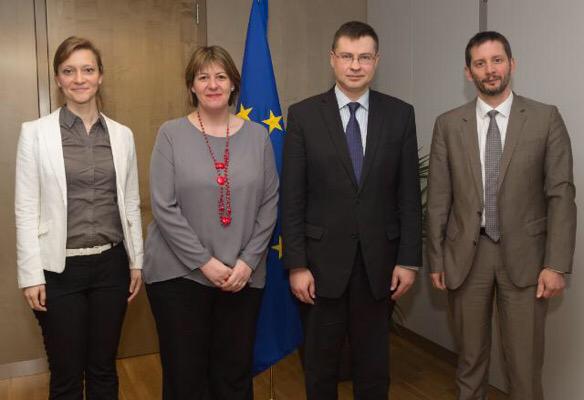VP Dombrovskis shares his ideas on social dimension of European Semester
 The 2015 European Semester process – the European Union’s annual cycle of economic policy guidance and surveillance – has already seen some improvements compared to the Semester cycles in previous years, but more can still be done to make it more social and ensure it contributes to achieving inclusive growth. This was the key focus of the 24 March meeting a delegation of Social Platform, led by our President Heather Roy, had with European Commission Vice-President Valdis Dombrovskis, responsible for the Euro and Social Dialogue as well as for the European Semester.
The 2015 European Semester process – the European Union’s annual cycle of economic policy guidance and surveillance – has already seen some improvements compared to the Semester cycles in previous years, but more can still be done to make it more social and ensure it contributes to achieving inclusive growth. This was the key focus of the 24 March meeting a delegation of Social Platform, led by our President Heather Roy, had with European Commission Vice-President Valdis Dombrovskis, responsible for the Euro and Social Dialogue as well as for the European Semester.
The Vice-President pointed out what he considers to be the main improvements of this year’s cycle: an upgraded use of employment and social indicators throughout the process; publication of country reports three months earlier, which allows more time for discussion with different stakeholders before the Country-Specific Recommendations (CSR) are published in June; and more input from social partners – representatives of employers and workers – prior to the publication of the Annual Growth Survey and the CSRs.
Heather Roy welcomed these improvements, but pointed out that there is still an important lack of civil dialogue, alongside social dialogue. Such civil dialogue with social non-governmental organisations (NGOs) at European as well as national level is highly needed to support democratic legitimacy and ownership of policies, and reinforces the adequacy of policies and measures proposed. We therefore requested more guidance from the European Commission on this, and in particular guidance addressed to member states.
One other thing we are currently missing is a clear link between the Semester and the Europe 2020 strategy and its headline targets, including the reduction of poverty and social exclusion. We are therefore asking for a more comprehensive and balanced approach with an ex-ante coordination and social impact assessments of policies and measures. It also requires the application of “parity”, for example regarding CSRs on economic and financial policies versus social ones, or regarding the implication of the ECOFIN versus the EPSCO Council.
Vice-President Dombrovskis mentioned that he is working towards more balance by giving more weight to social and employment indicators, and that he is currently looking into practical proposals with Commissioner Thyssen who is responsible for employment and social affairs.
As Social Platform, we were very happy with this first meeting with Vice-President Dombrovskis and hope this will lay the basis for more meaningful and structured dialogue in the future.













































